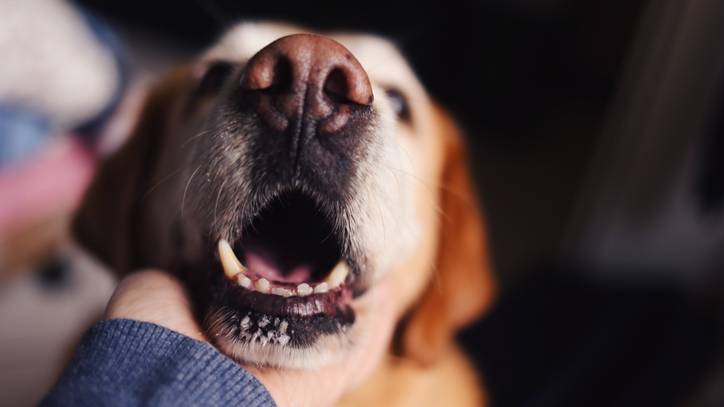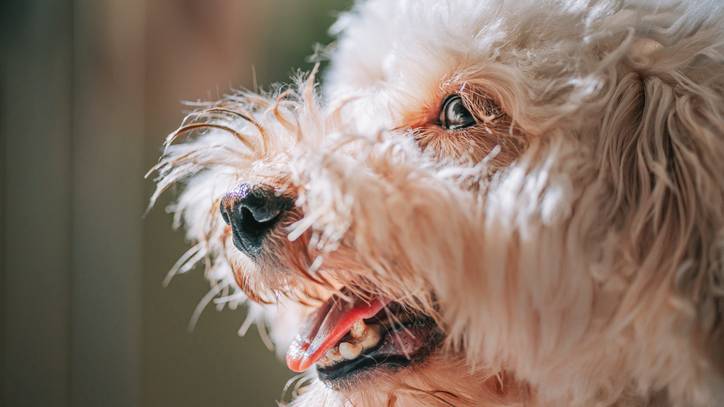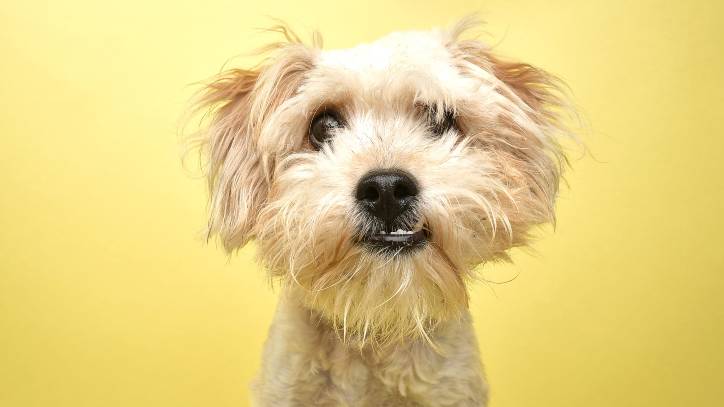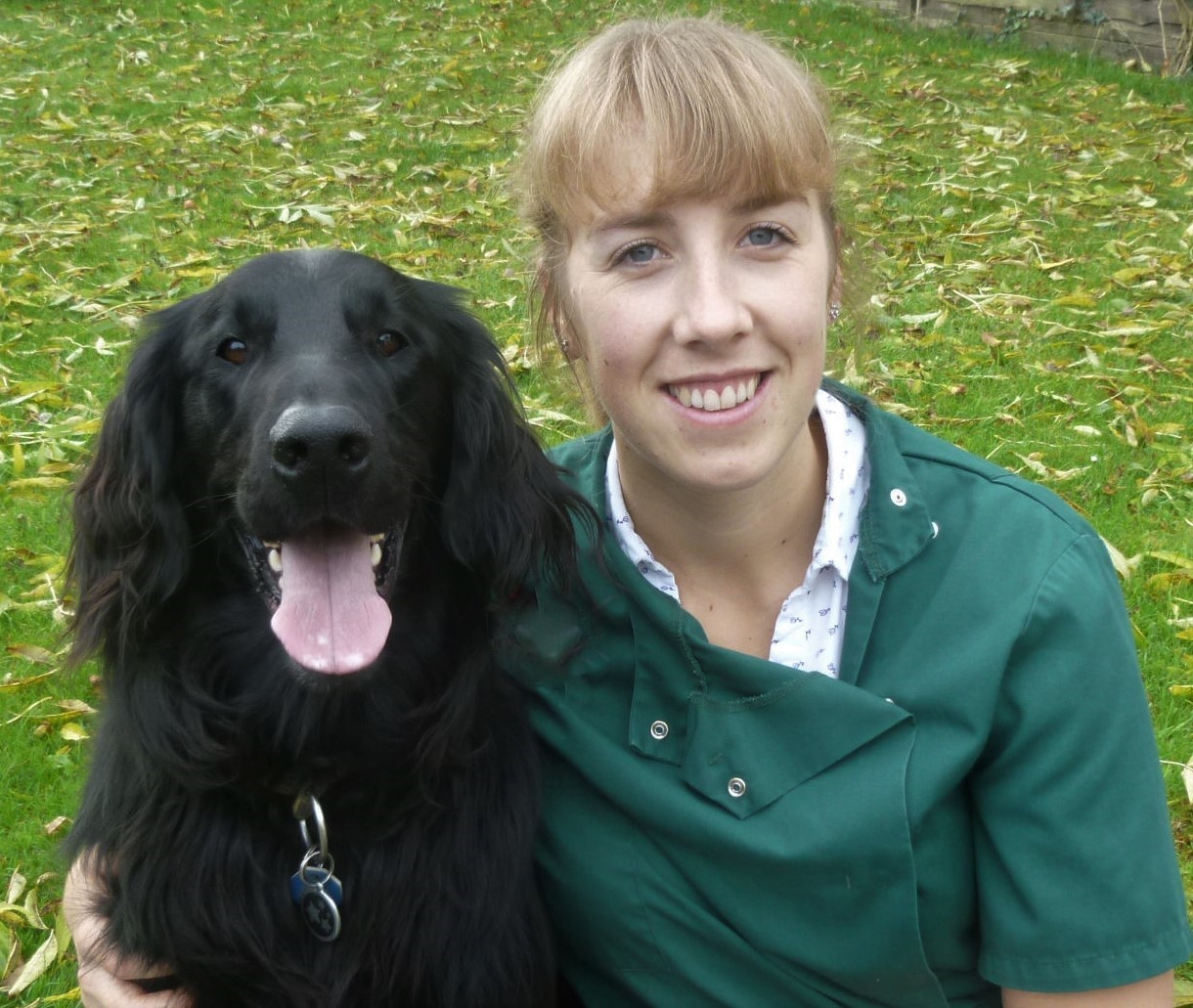Why is my dog grinding their teeth? Vet's guide to causes and treatment
Is your dog grinding their teeth? Our vet explores why this might be and how to help your pet

Is your dog grinding their teeth? This habit can be irritating to listen to, but it might cause you concern as well, particularly if it is new behavior for your pet.
We know that teeth grinding (also known as ‘bruxism’) in humans is not a good thing to do, but what about in dogs? They are unlikely to suffer from the same daily stresses and strains that cause many people to teeth grind so what could be causing it? Let’s explore further as well as what you can do to help your pet.
Why do dogs grind their teeth?
The following are possible causes of teeth grinding in dogs:
Oral pain
Most dogs will grind their teeth because of oral pain. There are a variety of things that could cause your dog discomfort in their mouth including:
- Periodontal disease (inflamed, sore gums)
- A fractured tooth
- An infection like a tooth root abscess
- A wound or injury to the tongue or other soft tissues in the mouth
- Jaw pain
- A tumor or growth in the mouth
- Teething pain in puppies
Most dogs are very stoic when it comes to oral pain so teeth grinding may be the only thing you notice. Many animals will continue to eat despite a bad mouth.
Malocclusion
Some dogs are born with a malalignment of their teeth, meaning that their might teeth rub and grind against each other abnormally. The most common malocclusions seen in dogs are underbites or overbites.
Gastrointestinal pain
Dogs with abdominal pain might demonstrate bruxism. Pain anywhere in the digestive tract could cause your dog to grind his teeth as a way of distracting himself.
Get the best advice, tips and top tech for your beloved Pets
Other signs of abdominal pain include a prayer position with his front legs on the floor and bottom in the air to relieve pressure in the abdomen, and possibly drooling, vomiting and diarrhea.
Focal seizures
Very occasionally dogs with partial or focal seizures may teeth grind or chatter, some will also bite the air or twitch. This is a type of fit that affects only a small part of the dog’s brain, as opposed to a full grand mal seizure that causes loss of consciousness.
Anxiety/stress
This is less commonly seen, but if your dog is very anxious or stressed they may grind their teeth or shake and chatter their jaws. This might happen when your dog is sleeping. Other signs of stress may include being unsettled, vocalising (howling or barking), inappropriate toileting, hiding away, digging or scratching at things.

Is teeth grinding harmful?
The occasional episode of tooth grinding is unlikely to cause problems, but if it continues over a long period then it could cause problems. Grinding teeth can cause the enamel on the teeth to become worn.
Over time this could expose the more sensitive parts of the tooth, leading to pain and the risk of infections. Jaw pain and muscular issues could also occur from ongoing tension and grinding.
How to stop a dog from grinding his teeth
To stop your dog from grinding his teeth you will need to address the underlying problem. You should start by taking your dog to a veterinarian for a check over. A physical exam will be performed and sometimes lab work is suggested depending on your vet’s findings.
If your vet suspects dental disease then a more thorough examination will usually be performed under anaesthetic, with your vet also being able to clean the teeth and perform extractions if required.
If your vet cannot find a health problem, then they may suggest referring you to a qualified animal behaviorist.

Keeping good oral hygiene in dogs
There are several steps you can take to ensure your dog has a healthy mouth and sweet-smelling breath:
1. Regular teeth brushing from an early age
Teeth brushing is just as important in dogs as it is in people, and you should aim to do this daily.
You should use dog-specific toothpaste; these are often meaty flavoured and are lower in fluoride than human pastes (so dogs don’t need to spit!). A soft bristle brush is best, choosing a size appropriate for your pet.
Introduce teeth brushing gradually. Start by letting them lick the paste off your fingers, then off the brush, before you start brushing their teeth. Keep sessions short, to begin with, and give your dog plenty of praise. For a more detailed guide visit our vet's guide to how to brush a dog's teeth.
2. An appropriate diet
Feeding your pet an appropriate diet will help greatly with oral health. Avoid scraps or titbits and stick to a good quality commercial diet. Ask your veterinarian for product recommendations, or look for products labelled with the Veterinary Oral Health Council (VOHC) seal, which certifies that the product has been tested and was proven to prevent plaque formation
Monitor your pet’s weight carefully. Being overweight was also highlighted as a risk factor for dental disease, particularly in small breed dogs in the previously mentioned study.
3. Teeth friendly toys and treats
Make sure you only give your pet dog-specific toys. Inappropriate toys could lead to dental damage. For example, fiber covered tennis balls are known to act as a scouring pad on the teeth causing wear to the enamel on dogs' teeth, so look at alternatives.
Feeding very hard treats and chews is also a problem in any breed of dog. Treats like bones (cooked or raw) or antlers, can cause fractures and chips to your pet’s teeth. This can lead to problems like exposed pulp, causing pain and tooth root abscesses.
4. Regular veterinary check-ups
Make sure your dog receives regular check-ups. His teeth will be examined at the time of his annual vaccinations, but if you notice anything you aren’t happy about then get him seen sooner.
5. Dental treatment
If your vet recommends dental treatment, then make sure you book your dog in! Delaying treatment will only allow the disease to progress further, making it more likely your dog will need extractions.
Summary
Teeth grinding in dogs is usually due to oral pain, though there are other possible causes. For some dogs, teeth grinding may be the only indicator they give you that there’s a problem, so don’t ignore it! Get them checked over by a vet to nip any problems in the bud.
Rebecca is a veterinary surgeon who graduated from the Royal Veterinary College in London in 2009. She enjoys medicine in particular and she is proud to have achieved a BSAVA postgraduate certificate in small animal medicine (with commendation) from Nottingham Trent University in 2021.
She has a wealth of experience in first opinion small animal practice, having done a mixture of day-to-day routine work, on-call emergency duties and managerial roles since 2009.
She writes on various feline and canine topics for the Veterinary Content Company and a freelance basis, including behavior, nutrition, and health. Outside of work and writing she enjoys walking her own dog, spending time with her young family and baking!

